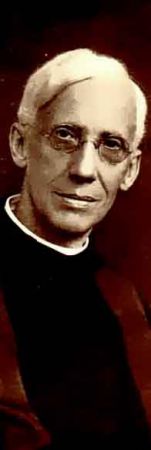
George Campbell Morgan (born this day, December 9, in 1863) used to be more famous than he is now. Best known as the pastor of Westminster Chapel in London, he also worked in the United States with Dwight L. Moody’s many projects, and taught widely in Bible Institutes. One contemporary called him “the hardest working preacher in Christendom.”
Morgan could make himself at home in many denominational settings: his father was a Baptist pastor, while Morgan sought (but was refused) ordination from the Methodists, and eventually was ordained as a Congregationalist, though he later pastored in a Presbyterian church.
As a pastor and teacher in troubled times, Morgan faced many complicated situations. His answer to every problem was the same: teach more Bible, teach it better. At the founding of a Bible conference, he announced his “platform, plan, and purpose:”
Our platform is that of the authority of Holy Scripture. Our plan is to study its teaching in itself and its application to life and service. Our purpose is the perfecting of the children of God in order to serve.
On this foundation he ministered for decades internationally, teaching the whole Bible with all his might. Wherever he taught, he drew crowds. And in an age of increasing polarization between liberals and fundamentalists, he fought hard to keep the main thing the main thing:
I have tried to remember that a phase of truth is not the whole of Truth. I do think that is important. I need not stay to stress it, but so many men I have known have squinted at one thing, and seen nothing else! There are some men who think that if you do not say something about the premillenial Coming every time you preach, you are unsound!
I think I will take my courage in both hands, and tell you a story. A good brother, a Baptist, gave out his text one morning — “Adam, where art thou?” and then said, “There are three lines we shall follow. First, where Adam was; secondly, how he was to be got from where he was; thirdly and lastly, a few words about baptism” !
Some of the worst heresies in the history of the Christian Church have been truth, distorted out of proper proportion and balance and relationship. I have striven, therefore, to remember that a phase of truth is not the whole truth.
File this under “Evangelicalism 100 years ago.” Morgan’s ministry gives a glimpse of an evangelicalism that was humble, confident, ecumenical, Bible based, and influential.
For more about Morgan: Read about his departure from Biola here, and about his book The Romance of the Bible here.